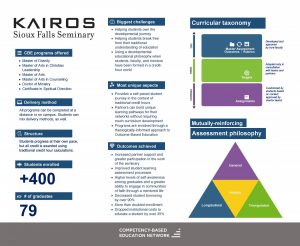Greetings from Palm Springs, California, site of CBTE 2019 an international gathering of people who are leading or are interested in Competency-Based Theological Education. The Kairos Project at Sioux Falls Seminary is the largest accredited CBTE program in the world, and we have been invited to share a bit about what we are doing.
Over the course of the week, I have given a keynote presentation, led a workshop on technology, led a consultation session with those interested in Kairos, and co-facilitated the closing session at the end of each day.
This gathering, the first of which occurred last year, is a great reminder that there seems to be a fresh movement of the Spirit within theological education. More and more people are open and interested in an approach to theological education that takes seriously the local contexts in which the students are engaged.
In my opening presentation, I shared a few of the foundational principles that support this philosophy of education. In particular, I attempted to help people see that CBTE simply reclaims what we have lost in education: things like relationships, formation within a local community of faith, contextual definitions of quality, and much more.
Perhaps what excites me the most about this philosophy of learning is that it challenges us to take seriously the fact that we are called to develop people in a holistic fashion, not simply to teach them in a different delivery format or to disseminate content through a particular model.
It calls us to a philosophy of learning that leverages the non-linear nature of human development, honors the fact that formation happens organically in community, sees assessment as a tool for learning, and empowers learners to play a lead role in their development.
And so…. embracing CBTE means accepting an invitation to look with fresh eyes at the industry’s long-held assumptions about learning, formation, and assessment – something not everyone is excited to do.
Now, much of this philosophy builds on the work of people like Knowles (androgogy), Mezirow (transformational learning), and Kolb (experiential learning). It assumes learning requires a mentor team that helps learners utilize Newitt Standford’s “readiness, challenge, and support” paradigm.
That’s a long “name-filled” way of saying…this stuff is not new!
What’s new is doing these things in the sphere of theological degrees – that is to say what’s new is doing this for degrees that have historically been built using content as the foundational building block. As a philosophy, CBTE requires the use of relationships, conversations, and assessment as the foundational building blocks.
The late Randy Reese, founder of VantagePoint3, an organization focused on adult development, put it this way:
A fundamental truth of adult development is that it is a slow and deep work that requires a long patience. Some things simply take time. Transformation of the person is more likely to come about with good questions in good company over time.
I think CBTE invites us to recognize the truth of Randy’s words and to then to create space for the Spirit to do its work in the lives of those God leads into theological education!








